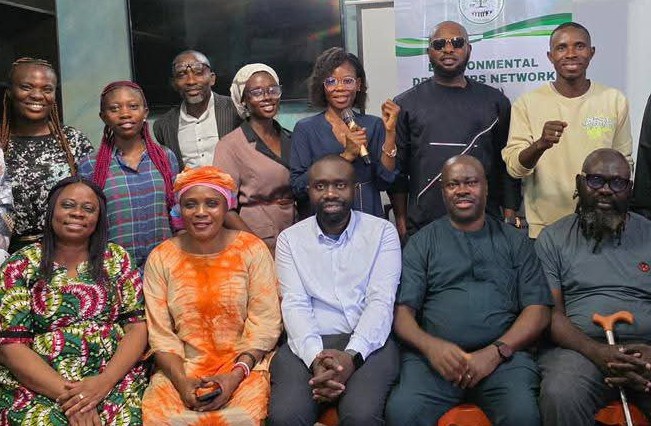In the course of the programme “Justice for the Planet: Strengthening Climate Litigation and Environmental Accountability in Nigeria” the Executive Director of Environmental Defenders Network(EDEN), Barrister Chima Williams, stated that climate justice is our right, and holding polluters and policymakers accountable is key to protecting lives and livelihoods across Nigeria.
According to him, “the greatest environmental despoilers are petroleum sector operators and not everybody can legislate or talk about issues related thereto.”
On the Constitution he asserted that “our Constitution has bestowed on the Federal Government of Nigeria the right over all our mineral resources. What this means is that the owners of the mineral resources of Nigeria are the Federal Government of Nigeria not the Federal Republic of Nigeria. Because it is the Federal Government, this will explain why citizens are deprived of the opportunity of looking at issues of the environment.”
On the land use act, he stated that it has given all lands in the state to the governor who holds it in trust for the citizens “and we can best explain as citizens how these governors are managing these resources that belong to all of us.”
He affirmed that “the African Charter on human and people’s rights has stated that citizens are entitled to enjoy an environment that’s conducive for their development. If that right is denied. An unhealthy environment will only give us an unhealthy people. If an environment is bad we all know what goes with it.”
Barrister Williams disclosed that “there’s an opportunity before us which is the Constitution amendment process that is ongoing. Citizens can take up the opportunity provided by the public hearings that are ongoing to demand that environment and issues related thereto should be moved from chapter two of the Constitution into and be included in chapter four.
“Secondly, that issues related to petroleum resources management should be moved from the exclusive legislative list of the Constitution be placed in the concurrent legislative list so that both state and Federal Government can legislate and action on issues related thereto.
“Thirdly, that the provision that bestows the resources of Nigeria on the Federal Government of Nigeria should be rejigged in place of Federal Government should be Federal Republic so that citizens can be entitled to their resources.”
In his keynote address/programme overview, Dr. Eghosa Ekhator challenged us to see children and youth not just as victims of climate change but as critical actors who can drive litigation and demand accountability, ensuring their future is safeguarded.
Chief Alagoa Morris while talking about “Community Organizing for Climate Resilience” shared powerful stories of grassroots organizing in the Niger Delta, reminding us that while communities are replanting quickly between floods to survive, government action remains slow, and environmental pollution from oil operations goes unpunished.
Talking on “The Place of Media in the Nigerian Climate Change Narratives”, Mr. Philip Jakpor highlighted the media’s role as a frontline tool in shaping narratives, amplifying community voices, and exposing environmental harms, cautioning against false solutions and emphasizing people-centered storytelling.
Advancing his thoughts on “Global Climate Movement to Combat Climate Crisis” Mr. Ubrei-Joe M. Mariere connected Nigeria’s struggle to the global climate justice movement, showing how movements like Friends of the Earth International and Climate Action Network have used protests, policy advocacy, and litigation to hold industries accountable while questioning if financial compensations truly repair the damage communities endure.
While speaking on “Litigations and Local Communities Under the Nigerian Petroleum Industry Act” Eric Omare Esq. unpacked the Petroleum Industry Act, revealing contradictions where agencies meant to enforce environmental laws are also pushing for oil exploration. He shared how litigation can compel companies and the government to fulfill environmental obligations, using Section 104 on gas flaring penalties as a live example.
Prof. Ngozi Stewart while on “Strengthening Climate Litigation and Environmental Governance in Nigeria” emphasized moving law from paper to impact, noting that while climate litigation is rare in Nigeria, existing frameworks like the Climate Change Act and the African Charter can empower public interest litigation. She reminded us that worsening climate impacts will not wait for the legal system to catch up, and it is time to act.
Dr. Muyiwa Adigun, who spoke on “Litigating Climate Change Before the ECOWAS Court”, explained how the ECOWAS Court offers a platform for bypassing domestic barriers, allowing individuals and NGOs to demand climate justice using the African Charter, making environmental rights enforceable regionally even when local systems fail.
Enumerating on “The Role of International Law in Protecting the Rights of Climate Change Victims” Dr. Matthew Nwankwo called on children and youth to rise, take ownership of their future, and use the courts to demand climate action, stressing that Nigeria’s legal framework now supports youth-led climate litigation as a tool for safeguarding their future.
Closing the programme, Barrister Taofeek Alatise, who spoke on “Climate Change Education as a Tool for Climate Justice in Nigeria”, called for climate-conscious lawyers and communities, stating that without embedding climate change education within legal training, Nigeria will struggle to produce lawyers who can drive climate justice and support accountability.
